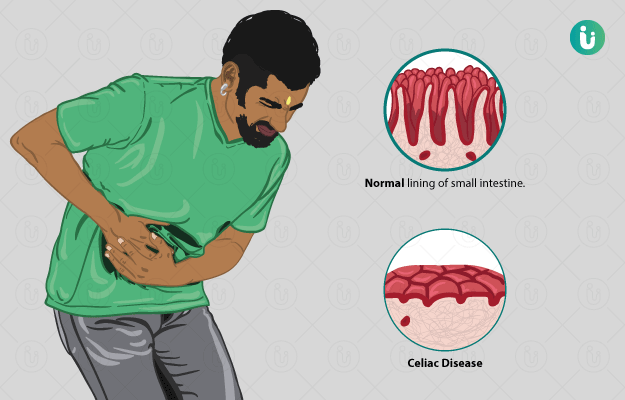What is Celiac Disease?
Celiac disease is a genetic autoimmune disorder that affects the digestive system. In this disorder, the body produces an immune response against a protein called gluten which is predominantly found in rye, wheat, and barley. After consumption of gluten-containing food, intestinal system damage is triggered due to inflammation of the intestinal villi. Hence, digestive compilations arise, which can be serious as well. This process further results in nutritional deficiency.
What are its main signs and symptoms?
Intestinal symptoms are more commonly experienced, which vary in adults and children. Some of these are listed below:
- Diarrhoea
- Abdominal bloating
- Constipation
- Vomiting
- Pale, loose, floating stools
- Indigestion
- Heartburn
- Acid reflux
Symptoms other than those of the digestive system include
- Anaemia and weight loss
- Loss of bone density
- Rash with itchy skin (Read more: Skin rash treatment)
- Discolouration or loss of dental enamel
- Headache
- Mouth ulcers
If you are tired of dieting and exercising and are not able to lose weight, then use myUpchar Ayurveda Medarodh Fat Burner Capsule, it has no side effects, order it today and avail the benefits.
What are its main causes?
Celiac disease is caused by genetic factors, environmental factors, and some immunological disorders, which create an immunological reaction to gluten from foods. It can also be caused by some underlying health conditions, such as type 1 diabetes, ulcerative colitis, thyroid disorders, epilepsy, and Down’s syndrome.
How is it diagnosed and treated?
The symptoms of celiac disease are often variable; hence, only 20% patients are diagnosed early. The diagnosis often includes checking the family history, medical history, and dietary patterns, and further extends to blood tests and a biopsy. Two blood tests are done: one is serological testing to detect the presence of antibody against gluten and the other is genetic testing for human leukocyte antigen (HLA). An intestinal biopsy is performed to check any structural damage to the intestinal villi. It is important to be on a gluten-containing diet until the confirmation of diagnosis for accurate and proper results. Follow-up testing should be continued annually and lifelong.
Strict, gluten-free diet is the only way to permanently treat celiac disease. One should avoid consuming gluten contained in foods, medications, vitamin supplements, or beverages. A nutritionist can help you create a personalized gluten-free diet that doesn’t miss out on important proteins. Healing of the damaged intestines starts within weeks, and villi regrowth occurs in some months. As the intestinal structure resumes and inflammation clears, the symptoms disappear. One should take proper precautions for food items, drinks, etc. Read packaged food labels carefully for each item to confirm the presence/absence of gluten. Some gluten-free food, grains, or starches include

 Doctors for Celiac Disease
Doctors for Celiac Disease 


















